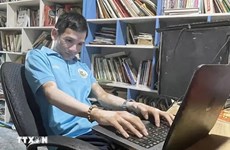RSF: Why is the same play restaged all the time?
France-based Reporters Without Borders (RSF) on March 12 released a
so-called survey on the right to freedom of expression on social
networks.
RSF’s Secretary General Jean-Francois Julliard said in a communique that around 60 nations have censored the Internet to some extent, and at the same time have disturbed network citizens (netizens).
RSF’s Secretary General Jean-Francois Julliard said in a communique that around 60 nations have censored the Internet to some extent, and at the same time have disturbed network citizens (netizens).
France-based Reporters Without Borders (RSF) on March 12 released a
so-called survey on the right to freedom of expression on social
networks.
RSF’s Secretary General Jean-Francois Julliard said in a communique that around 60 nations have censored the Internet to some extent, and at the same time have disturbed network citizens (netizens).
It was very odd when RSF continued to announce its list of “Enemies of the Internet” which included 10 nations often harassed by RSF – including Vietnam, Cuba, China, Myanmar, the Democratic People’s Republic of Korea and Iran.
Besides the list of “Enemies of the Internet”, 16 other nations were placed under “surveillance” such as Australia , France , the Republic of Korea , Sri Lanka , Thailand and Malaysia .
In its report, RSF mentioned a series of cases in Vietnam the organisation itself called violations of Internet freedom and “spontaneously” cited the blocking of the social networking site, Facebook, without giving any evidences. RSF did not forget to accuse the Vietnamese Government of issuing many circulars and decrees aimed at tightening control over the Internet, including forcing Internet coffee kiosks to close early or install software to prevent access to “bad” websites. Called itself a pro-press freedom organisation, RSF accused Vietnam of detaining 17 netizens – the second largest number in the world according to its inventory.
RSF actually disregarded individuals and organisations throughout the world when it thought that they innocently believed in such simple denouncements.
Among the above-mentioned groundless denouncements, only one is argued, and the organisation’s “hastiness” can be exposed. If RSF’s “researchers” spent more time reading a series of articles published in 2010 and in previous years, they would find stories about how online games and young people’s over-indulgence in the games, and pornographic websites, lead to social evils and serious matters in Vietnamese society.
The management of Internet coffee kiosks, especially those next to schools, and the blocking of websites containing contents that are harmful and contrary to national habits and customs are now replaced with a “political label” as blame for the prevention of freedom of speech. A number of citizens who intentionally abused the Internet to violate laws and were then punished in accordance with the law – as in other civilised countries – are suddenly elevated into “heroic netizens” by RSF.
It is essential to cite several figures to show how an “enemy of the Internet” has actually developed the Internet. In 1997, Vietnam gained access to global web services for the first time. Since then the use of the Internet in the country has developed very rapidly.
Statistics released by the International Telecommunication Union (ITU) – the UN agency for information and communication technologies, showed that Vietnam saw approximately 200,000 Internet users in 2000, accounting for just 0.3 percent of its population. The figure rose to 16.7 million in 2007, equivalent to 19.7 percent of the population, and by the end of 2010, Vietnam had 24.26 million Internet users, representing 27.1 percent of the population. Vietnam nearly entered the list of the Top 20 nations with the largest number of Internet users by World Internet Stats. Canada , the 20 th nation on the list, boasts 26.2 million Internet users.
The rate of Internet users in Vietnam almost reaches the world’s average of 28.7 percent and is higher than Asia ’s average of 21.5 percent. Many nations which were listed as “Enemies of the Internet” or placed under “surveillance” by RSF also have high proportions of Internet users as compared with their total populations.
In addition, social networks have developed rapidly in Vietnam . A survey released on May 20, 2010 by Yahoo and Kantar Media indicated that the sharing of contents and viewpoints on social networks and participation in online forums was more popular than making friends and social connections. According to statistics, by December 2010, six social networks that have developed most rapidly in Vietnam included ZingMe (4.6 million members), Facebook (3.5 million members) and Yahoo (3.1 million members), Yume (2.6 million members), GoOnline (1.6 million members), and Tamtay (1 million users). Some other smaller networks are KunKun, Cyworld and Yobanbe. Facebook estimated itself it had approximately 2 million users by January 2011.
It was unreasonable for RSF to place itself in a “superexcellent” position to judge the entire world and accuse up to 60 nations to different extents.
RSF’s list and its hasty assessments are not too different from those it had issued in previous years, excluding the addition and cutting of one or two nations in an attempt to make it transparent. Whenever RSF fails to clean smears on its own shirt, a list of hostilities for the following years is predictable. Whoever sees the list can only repeat the question: “Why is the same play restaged all the time?”./.
RSF’s Secretary General Jean-Francois Julliard said in a communique that around 60 nations have censored the Internet to some extent, and at the same time have disturbed network citizens (netizens).
It was very odd when RSF continued to announce its list of “Enemies of the Internet” which included 10 nations often harassed by RSF – including Vietnam, Cuba, China, Myanmar, the Democratic People’s Republic of Korea and Iran.
Besides the list of “Enemies of the Internet”, 16 other nations were placed under “surveillance” such as Australia , France , the Republic of Korea , Sri Lanka , Thailand and Malaysia .
In its report, RSF mentioned a series of cases in Vietnam the organisation itself called violations of Internet freedom and “spontaneously” cited the blocking of the social networking site, Facebook, without giving any evidences. RSF did not forget to accuse the Vietnamese Government of issuing many circulars and decrees aimed at tightening control over the Internet, including forcing Internet coffee kiosks to close early or install software to prevent access to “bad” websites. Called itself a pro-press freedom organisation, RSF accused Vietnam of detaining 17 netizens – the second largest number in the world according to its inventory.
RSF actually disregarded individuals and organisations throughout the world when it thought that they innocently believed in such simple denouncements.
Among the above-mentioned groundless denouncements, only one is argued, and the organisation’s “hastiness” can be exposed. If RSF’s “researchers” spent more time reading a series of articles published in 2010 and in previous years, they would find stories about how online games and young people’s over-indulgence in the games, and pornographic websites, lead to social evils and serious matters in Vietnamese society.
The management of Internet coffee kiosks, especially those next to schools, and the blocking of websites containing contents that are harmful and contrary to national habits and customs are now replaced with a “political label” as blame for the prevention of freedom of speech. A number of citizens who intentionally abused the Internet to violate laws and were then punished in accordance with the law – as in other civilised countries – are suddenly elevated into “heroic netizens” by RSF.
It is essential to cite several figures to show how an “enemy of the Internet” has actually developed the Internet. In 1997, Vietnam gained access to global web services for the first time. Since then the use of the Internet in the country has developed very rapidly.
Statistics released by the International Telecommunication Union (ITU) – the UN agency for information and communication technologies, showed that Vietnam saw approximately 200,000 Internet users in 2000, accounting for just 0.3 percent of its population. The figure rose to 16.7 million in 2007, equivalent to 19.7 percent of the population, and by the end of 2010, Vietnam had 24.26 million Internet users, representing 27.1 percent of the population. Vietnam nearly entered the list of the Top 20 nations with the largest number of Internet users by World Internet Stats. Canada , the 20 th nation on the list, boasts 26.2 million Internet users.
The rate of Internet users in Vietnam almost reaches the world’s average of 28.7 percent and is higher than Asia ’s average of 21.5 percent. Many nations which were listed as “Enemies of the Internet” or placed under “surveillance” by RSF also have high proportions of Internet users as compared with their total populations.
In addition, social networks have developed rapidly in Vietnam . A survey released on May 20, 2010 by Yahoo and Kantar Media indicated that the sharing of contents and viewpoints on social networks and participation in online forums was more popular than making friends and social connections. According to statistics, by December 2010, six social networks that have developed most rapidly in Vietnam included ZingMe (4.6 million members), Facebook (3.5 million members) and Yahoo (3.1 million members), Yume (2.6 million members), GoOnline (1.6 million members), and Tamtay (1 million users). Some other smaller networks are KunKun, Cyworld and Yobanbe. Facebook estimated itself it had approximately 2 million users by January 2011.
It was unreasonable for RSF to place itself in a “superexcellent” position to judge the entire world and accuse up to 60 nations to different extents.
RSF’s list and its hasty assessments are not too different from those it had issued in previous years, excluding the addition and cutting of one or two nations in an attempt to make it transparent. Whenever RSF fails to clean smears on its own shirt, a list of hostilities for the following years is predictable. Whoever sees the list can only repeat the question: “Why is the same play restaged all the time?”./.













